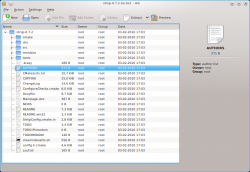Ark/es: Difference between revisions
Appearance
Created page with '==Extrayendo ficheros==' |
Created page with 'Este es el uso que la mayoría de las personas encontrarán primero. * Con un único fichero seleccionado, se le preguntara si quiere extraer ese fichero o todos los ficheros * E...' |
||
| Line 22: | Line 22: | ||
==Extrayendo ficheros== | ==Extrayendo ficheros== | ||
Este es el uso que la mayoría de las personas encontrarán primero. | |||
* | * Con un único fichero seleccionado, se le preguntara si quiere extraer ese fichero o todos los ficheros | ||
* | * El archivo permanece completo y el fichero que usted seleccionó se ubicará en el directorio de su preferencia | ||
The way that extracting works has changed in recent versions, so may feel strange to someone recently working with KDE3. There are two ways that you can control the Extraction. | The way that extracting works has changed in recent versions, so may feel strange to someone recently working with KDE3. There are two ways that you can control the Extraction. | ||
Revision as of 20:03, 15 September 2010
Template:I18n/Language Navigation Bar
 |
Ark is an application to manage archives of files |
Características
Ark le permite
- Crear un archivo comprimido
- Ver los contenidos de un archivo de almacenamiento
- Extraer el contenido de un archivo a un directorio de su elección.
Puede manejar muchos formatos, incluyendo tar, gzip, bzip2, zip, rar y 7z.
Creando un archivo
- Los ficheros pueden ser añadidos para formar el archivo usando el menú Acción
- Alternativamente, los ficheros pueden ser arrastrados desde una ventana de Konqueror o Dolphin hacia la ventana principal de Ark
- También en el menú Acción se encuentra , que puede enviar un directorio completo hacia dentro del archivo
- Los ficheros pueden ser añadidos en cualquier momento a un fichero previamente guardado
Extrayendo ficheros
Este es el uso que la mayoría de las personas encontrarán primero.
- Con un único fichero seleccionado, se le preguntara si quiere extraer ese fichero o todos los ficheros
- El archivo permanece completo y el fichero que usted seleccionó se ubicará en el directorio de su preferencia
The way that extracting works has changed in recent versions, so may feel strange to someone recently working with KDE3. There are two ways that you can control the Extraction.
- When viewing the archive within Ark, use button on the toolbar or Ctrl-E . This gives you a navigable tree where you can select your destination.
- When viewing the archive in Dolphin, right click on it and you will get three options:
- Extract here, Autodetect Subfolder
- Extract to....
- Extract here.
- The second option works the same as Ctrl-E within Ark.
- The third option does exactly what it says - if no folder is defined within the archive, all the extracted files will end up in the current directory. If the archive does contain a folder, then a folder will be created under the current folder, and all files extracted into that folder.
- The first option is similar to the third one, but when no folder is defined within the archive, Ark will create one, then all files extracted into that folder. If, for instance, your archive is called Patterns.zip and it contains all the designs, you would end up with a structure like ~/Patterns/design1 etc.
Working with Files
- Very often an archive will contain a README or some other instruction file. It is often useful to be able to preview that file before starting work with the archive. Double click any file in archive will open preview.
- It may be that one file in an archive becomes irrelevant. The file can be deleted within the archive.
- In the KDE3 version it is possible to any suitable application
- It is also possible, in the KDE3 version, to an application.
(These two features are not available in the KDE SC 4 version yet)
